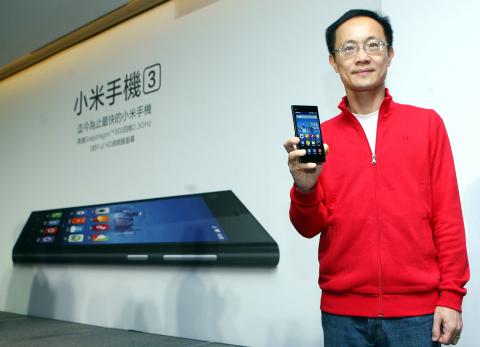Chinese smartphone start-up Xiaomi Corp (小米) yesterday partnered with Chunghwa Telecom Co (中華電信) to sell its phones in Taiwan as part of a push to double its global shipments to 40 million units this year.
Xiaomi last year shipped 18.7 million units worldwide, company co-founder and president Bin Lin (林斌) said during a media briefing to unveil the company’s latest flagship model, the Mi3, in Taipei yesterday.
With its home market its biggest contributor to sales, Xiaomi is aggressively exploring new markets, such as Southeast Asia, to seek further growth, Lin said.

Photo: CNA
Xiaomi, based in Shenzhen, will make its first move by tapping the Singaporean market early next month after Xiaomi Global vice president Hugo Barra first revealed the company’s overseas expansion plans in Taipei in December last year.
Chunghwa Telecom, the nation’s top telecom, joins local peer Far EasTone Telecommunications Co (遠傳電信) in offering the Mi3. Far EasTone sells the phone in a package that includes a screen protector for NT$10,599.
Last year, Far EasTone obtained the exclusive rights to sell Xiaomi smartphones, including the Mi2 and the Red Rice in Taiwan.
Xiaomi sold more than 200,000 phones in Taiwan last year, according to Far EasTone.
Presales of the Mi3 are scheduled to begin today at Far EasTone and Chunghwa Telecom stores.
Consumers can get a free Mi3 by signing up for a Far EasTone service plan with a minimal monthly fee of NT$1,773, or subscribing to Chunghwa Telecom’s service plan and paying a NT$1,143 minimum monthly fee.
The Mi3 will be also available on Xiaomi’s Web site for NT$9,999 from Wednesday next week.
The Mi3 is equipped with Qualcomm’s Snapdragon 800 chip and a 5-inch high-definition screen.
Separately, Far EasTone vice president Maxwell Cheng (鄭智衡) said yesterday that the company plans to purchase 2.5 million smartphones this year, half of them entry-level models.

Taiwan Transport and Storage Corp (TTS, 台灣通運倉儲) yesterday unveiled its first electric tractor unit — manufactured by Volvo Trucks — in a ceremony in Taipei, and said the unit would soon be used to transport cement produced by Taiwan Cement Corp (TCC, 台灣水泥). Both TTS and TCC belong to TCC International Holdings Ltd (台泥國際集團). With the electric tractor unit, the Taipei-based cement firm would become the first in Taiwan to use electric vehicles to transport construction materials. TTS chairman Koo Kung-yi (辜公怡), Volvo Trucks vice president of sales and marketing Johan Selven, TCC president Roman Cheng (程耀輝) and Taikoo Motors Group

Among the rows of vibrators, rubber torsos and leather harnesses at a Chinese sex toys exhibition in Shanghai this weekend, the beginnings of an artificial intelligence (AI)-driven shift in the industry quietly pulsed. China manufactures about 70 percent of the world’s sex toys, most of it the “hardware” on display at the fair — whether that be technicolor tentacled dildos or hyper-realistic personalized silicone dolls. Yet smart toys have been rising in popularity for some time. Many major European and US brands already offer tech-enhanced products that can enable long-distance love, monitor well-being and even bring people one step closer to

RECORD-BREAKING: TSMC’s net profit last quarter beat market expectations by expanding 8.9% and it was the best first-quarter profit in the chipmaker’s history Taiwan Semiconductor Manufacturing Co (TSMC, 台積電), which counts Nvidia Corp as a key customer, yesterday said that artificial intelligence (AI) server chip revenue is set to more than double this year from last year amid rising demand. The chipmaker expects the growth momentum to continue in the next five years with an annual compound growth rate of 50 percent, TSMC chief executive officer C.C. Wei (魏哲家) told investors yesterday. By 2028, AI chips’ contribution to revenue would climb to about 20 percent from a percentage in the low teens, Wei said. “Almost all the AI innovators are working with TSMC to address the

Malaysia’s leader yesterday announced plans to build a massive semiconductor design park, aiming to boost the Southeast Asian nation’s role in the global chip industry. A prominent player in the semiconductor industry for decades, Malaysia accounts for an estimated 13 percent of global back-end manufacturing, according to German tech giant Bosch. Now it wants to go beyond production and emerge as a chip design powerhouse too, Malaysian Prime Minister Anwar Ibrahim said. “I am pleased to announce the largest IC (integrated circuit) Design Park in Southeast Asia, that will house world-class anchor tenants and collaborate with global companies such as Arm [Holdings PLC],”